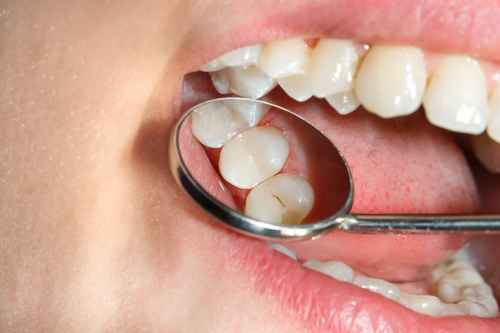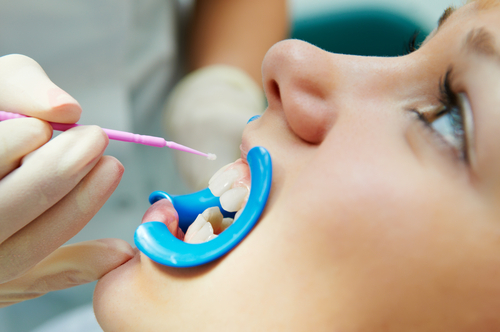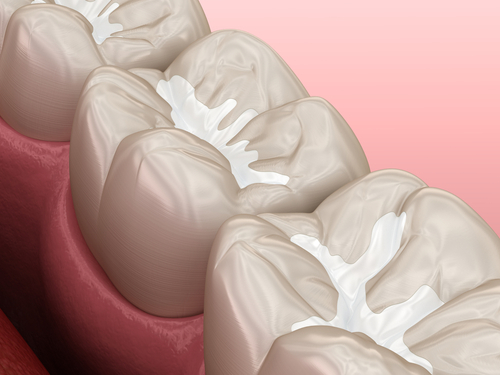Can You Get Dental Sealants?
Our dentists in Westland may recommend dental sealants to:
- Children and Teenagers: Dental sealants are most commonly applied to children and teenagers as their permanent molars and premolars come in.
- Adults with Deep Fissures: Adults who have deep pits and fissures in their molars and premolars may also benefit from dental sealants.
- Individuals at High Risk of Cavities: Some people are at a higher risk of developing cavities due to factors such as a history of tooth decay, poor oral hygiene habits, a diet high in sugary or acidic foods, or conditions that reduce saliva production (xerostomia or dry mouth).
- Individuals with Orthodontic Appliances: Patients with braces or other orthodontic appliances may find it challenging to clean around brackets and wires. Sealants can provide an extra layer of protection during orthodontic treatment.
- Special Needs Patients: Individuals with developmental or cognitive disabilities may have difficulty maintaining optimal oral hygiene. Dental sealants can be particularly beneficial for this group to reduce the risk of cavities.
- Patients With Dental Anxiety: For individuals with dental anxiety, preventive measures like sealants can help reduce the need for more invasive dental treatments, potentially making dental visits less stressful.
To find out if you qualify for dental sealants, contact our dental office today by calling (734) 261-6060.
Costs of Dental Sealants in Westaland
Dental sealants are a relatively cheaper dental treatment, with prices around $30 to $40 per tooth. Certain factors will affect the total price, such as your location, the number of teeth getting sealants, and your insurance coverage.
You can receive an estimate by contacting our Westland, MI dentist today.
Dental Sealants vs. Other Preventive Treatments
Dental sealants work differently from other preventive treatments, making them a valuable addition to your oral health routine.
- Fluoride vs. Sealants: Fluoride strengthens tooth enamel and provides overall protection, while sealants create a physical barrier in hard-to-reach grooves and fissures. Fluoride treatments are applied every six months, but sealants offer continuous protection for years.
- Professional Cleanings vs. Sealants: Regular cleanings remove plaque and tartar buildup but don’t provide ongoing protection between visits. Sealants complement cleanings by preventing bacterial accumulation in vulnerable areas.
- Oral Hygiene vs. Sealants: Even with excellent brushing and flossing, deep pits and fissures can be difficult to clean thoroughly. Sealants make these surfaces smoother and easier to clean while providing extra protection where toothbrush bristles can’t reach.
The most effective approach combines sealants with regular fluoride treatments, professional cleanings, and good daily oral hygiene for comprehensive cavity prevention.
Caring for Your Dental Sealants
Proper care helps your dental sealants protect your teeth for many years.
- Daily Care: Continue your normal oral hygiene routine. Brush twice daily with fluoride toothpaste and floss regularly. The smooth sealant surface actually makes cleaning easier and more effective.
- What to Avoid: Don’t chew on hard objects like ice, pencils, or fingernails, which can chip sealants. Be cautious with extremely sticky foods that might pull at sealant edges.
- Regular Check-ups: Visit your dentist every six months for cleanings and sealant inspections. Your dentist will check for wear, chipping, or detachment and repair issues early.
- Warning Signs: Contact your dentist if you notice rough surfaces, sharp edges, increased sensitivity, or food getting stuck in previously sealed areas.
- Maximizing Longevity: Use a soft-bristled toothbrush, consider a night guard if you grind your teeth, and maintain a balanced diet low in sugary foods. Professional fluoride treatments can continue to strengthen unsealed tooth surfaces.



